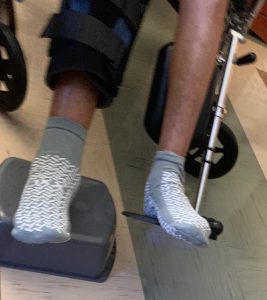Right Knee Injury Caused by Left Knee Injury: Compensable Consequence
What happens when one injury causes another injury? What if you hurt one side of your body and then something goes wrong on the other side? And what the heck is a “compensable consequence?”

We all know what is meant when someone tells us that they have injured their left leg and they are “favoring their right leg.” It means that because the left side is not working, hurts or is in a brace or cast, they are using their legs unequally. They put more weight on the uninjured side while the damaged limb heals. However, this sometimes leads to injury on the formerly “healthy” side. Injury lawyer Doug Landau has helped a number of clients who had ramifications from their original injury. Under Virginia Workers Compensation law, if an employee has a compensable injury and this leads to an injury to another body part, that second condition can be covered as a “compensable consequence.” While there are limits to this doctrine that will be covered in the next post, a 2019 case on this point is instructive.
FACTS:
The worker sustained a compensable left knee meniscal tear as the result of a 2006 job injury, which was scoped. He had a right knee replacement in 2009. There was no indication that the right knee surgery was related to claimant’s earlier left knee injury.
The injury to the worker’s left knee changed the way he walked. He limped, supporting his weight with his right leg. His right knee began to hurt again in 2016 or 2017. In 2017, his primary care physician said that his patient had “severe bilateral osteoarthritis of the knees, gout, [and] morbid obesity now with gait instability.” The doctor recommended that the injured worker use a cane or walker “at all times.” In 2018, the doctor responded to a questionnaire from the worker’s attorney. The doctor stated that the alteration of the claimant’s gait had caused additional stress to his right knee, but that it was “unknown” whether the claimant’s difficulties with his right knee were a consequence of the injury to his left knee.
The authorized treating surgeon performed a total knee replacement on the claimant’s left knee in 2017. This attending physician indicated in a questionnaire from the worker’s attorney in 2018, that the claimant’s right knee difficulties were a consequence of his left knee injury in 2006 and that claimant would “require right total knee revision surgery due to undo stress from gait alteration due to his left knee injury.”
RESULT:
The injured worker won at the trial level, and again on appeal to the Full Commission in Richmond. Testimony from the claimant and his doctors that his prior left knee injury caused his right knee injury was sufficient to support the Virginia Workers Compensation Commission’s decision. Based on testimony from the claimant at the Hearing before the Deputy Commissioner and worker’s medical records, the Virginia Workers Compensation Commission (“VWC”) determined that the claimant “proved a direct, probable connection between his established left knee injury and harm to his right knee. Such harm – the mechanical change to a replaced right knee – is ‘sequelae that flow[ed] from the primary injury.’”

The evidence supported the VWC’s decision that the worker’s right knee injury was a compensable consequence of his earlier left knee injury. The worker testified that the injury to his left knee caused him to put his weight on his right leg when he walked. His primary care doctor stated that the alteration to his gait had caused additional stress to his right knee. The worker’s orthopedic surgeon stated that his patient’s right knee difficulties were a consequence of his left knee injury in 2006 and that he would “require right total knee revision surgery due to undo stress from gait alteration due to his left knee injury.” No independent medical examination by the insurance company was conducted.
The Virginia Court of Appeals, in an unpublished decision, affirmed the decision awarding benefits in favor of the injured worker in the case of Nanochemonics Holdings LLC v. McKinney. If you or someone you care about has been injured at work, and there are questions as to how best to proceed, please call us at (703)-796-9555 or contact us via e-mail here on our Landau Injury Law website.
